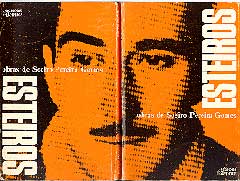
|
|
|
| History of Portuguese Literature | Origins of Portuguese Literature | The Portuguese Language | Oral Literature | Fiction | Lyricism |
| Travel Literature | Cantigas de amigo | Historiography | Doctrinal Prose | ||
| Baroque and Mannerism | Classics | Existentialism | Experimentalism | Enlightenment | Modernity |
| Neo-Realism | Post-Modernism | Realism | Romanticism | Saudosismo | Symbolism |
Neo-Realism
|
|
A literary movement deriving from Italian influences, but also including a number of features from Brazilian literature, particularly the denunciation of social injustice as found in the romance nordestino (North-Eastern novel). Both in terms of poetry and prose, neo-realism acquired a dimension of social intervention, made more acute by post-war events and by the seductive appeal of the socialist systems mythified by the social climate engendered in Portugal by the political dictatorship.
 Front and back covers of the book: Soeiro Pereira Gomes, Esteiros, Edições Avante |
Its
poetic origins were centred on the group linked to the
Novo Cancioneiro, a collection of poetry, with Sidónio
Muralha, João José Cochofel, Carlos
de Oliveira, Manuel da Fonseca,
Mário Dionísio, Fernando
Namora and others.
In
regard to the novel, the movement was begun by Soeiro
Pereira Gomes, with Esteiros, and Alves Redol,
with Gaibéus, published in 1940, who
both brought an extensive and representative body of work into the area of
fiction, which was also greatly enriched by the contributions of many of the
other poets already mentioned (in particular the first four).
The
neo-realist novel reactivated the mechanisms of narrative representation, being
inspired by the Marxist categories of class consciousness and the class struggle
and centring upon the social conflicts between peasants, workers, bosses,
landlords and estate owners, but the best texts are those that offer a keen and
incisive analysis of the different facets of these diverse social groupings. Some
of the more notable examples of this are Uma
Abelha na Chuva, by Carlos de Oliveira,
Seara de Vento, by Manuel da
Fonseca, O Dia Cinzento, by Mário
Dionísio and Domingo à Tarde,
by Fernando Namora.
Existentialism
and certain components of modernity are brought together most successfully in
later works by José
Cardoso Pires (O Anjo Ancorado
and O Hóspede de Job), Urbano
Tavares Rodrigues (Bastardos do
Sol), Alexandre
Pinheiro Torres (A
Nau de Quixibá), or Orlando da Costa
(Podem Chamar-me Eurídice).
© Instituto Camões, 2001